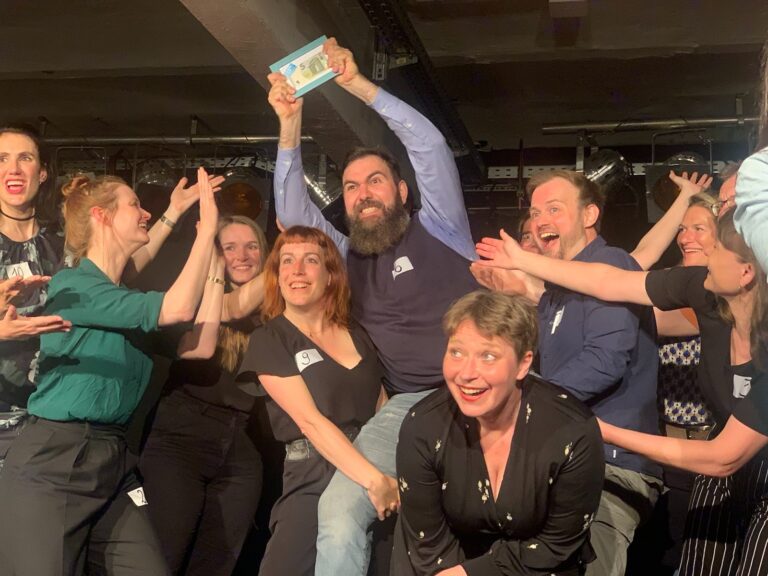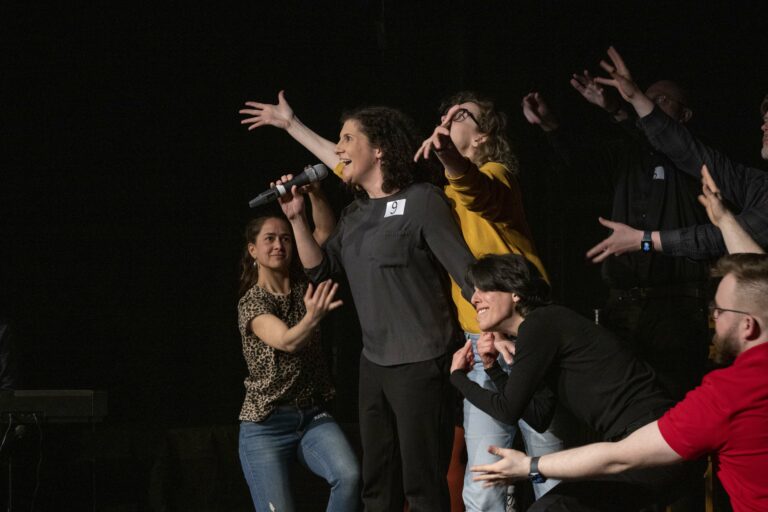Reason 1: Retraining impulses
From my experience, most people tend to react defensively or pejoratively under stress in order to protect themselves. As a result, 90 percent of all scenes begin negatively with impro newcomers (and not just with those). In part, the negativity is hidden, it’s little things that are wrong, that you or my partner are not doing right. “You are late.” is a much more common phrase than “Great, you’re here at just the right time.”
So when we start improvisational theatre, there are impulses that we have to “retrain”. To have a plan and not to let yourself be distracted from it can be very helpful in everyday life. For improvisation on stage it is rather uninteresting. To ask questions to people can signal great interest in my fellow human beings outside the stage, but on stage it very often shows insecurity. Because: We tend to ask for information in order to hand over responsibility to the other person. A similar impulse is the initial negativity. To protect ourselves, quite useful in everyday life, but problematic for the stage. Why?
Reason 2: The creative process
When we create a scene/story/situation together, we make ourselves vulnerable. I give an idea and with it a piece of me, and when my partner goes into it, we are in the middle of being creative together. If I now – subliminally or openly – always (re-)act negatively and critically, my counterpart gets the feeling that his/her ideas are not good enough. And automatically the other person suddenly feels uncreative. (An experiment, which by the way can be done quite easily).
Therefore: Being positive relieves my fellow players and helps the creative engine to get going.
Reason 3: Raising the stakes
Saturday night. At the club. All evening long I’ve been watching an attractive man with a stunning smile at the other end of the room.
Scenario 1: I dare to approach him and tell him that I can’t take my eyes off him and that I find him incredibly attractive. – He beams at me, answers me: “Wow, that’s great that you’re talking to me. Can I buy you a beer?” We were both positive.
The beginning of a story about you and me.
Scenario 2: I dare to approach him and tell him that I can’t take my eyes off him and that I find him incredibly attractive. – He laughs out loud and answers, that he doesn’t need to hear this from someone like me, then turns to his buddies to tell them how pityful I am to talk to him so clumsily. I was positive. He was negative.
The beginning of my story.
Scenario 3: I dare to approach him. I get cold feet on the way there, so when I get there I just say: “Hey you, I just wanted to tell you that your shirt is not buttoned up properly. – He replies, “Why don’t you mind your own business?” We were both negative.
End of story.
As soon as (at least) one character on stage behaves positively, he or she raises the stakes. If you make yourself vulnerable then there is something important to you. On the one hand, this makes you sympathetic and thus suitable for the audience to identify with, on the other hand it becomes easier to let something happen to your character and thus tell a story.
(But aren’t there also improv schools where people are taught to start in the middle of a conflict? Is that “wrong” then? – No. But that would go beyond the scope here…)
Nadine Antler



